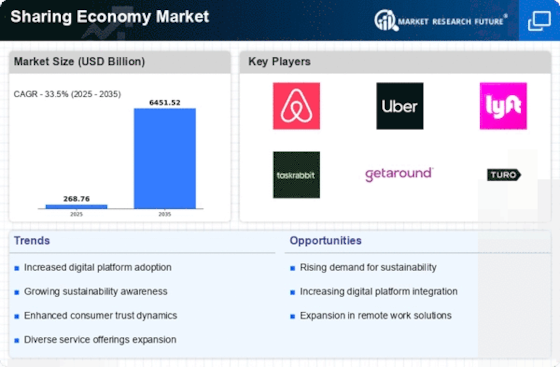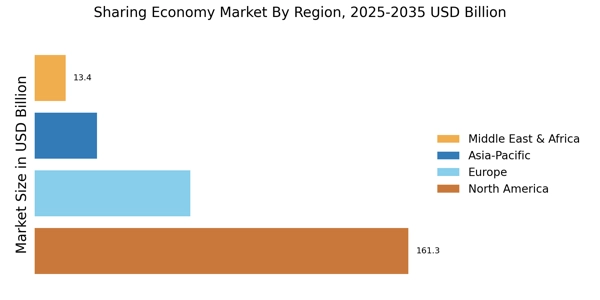Regulatory Support and Frameworks
Regulatory support and frameworks are becoming increasingly relevant to the Sharing Economy Market. Governments are recognizing the potential economic benefits of sharing economy models and are beginning to implement policies that facilitate their growth. This includes creating legal structures that support peer-to-peer transactions and ensuring consumer protection. For instance, some regions have introduced regulations that promote transparency and safety in ride-sharing and accommodation services. As of 2025, it is anticipated that more jurisdictions will adopt favorable regulations, which could enhance market confidence and encourage investment in sharing economy ventures. This supportive regulatory environment is likely to bolster the Sharing Economy Market, enabling it to thrive in a competitive landscape.
Urbanization and Changing Lifestyles
Urbanization is a driving force behind the evolution of the Sharing Economy Market. As more individuals migrate to urban areas, the demand for flexible and accessible services increases. Urban dwellers often face space constraints and high living costs, prompting them to seek shared solutions for transportation, housing, and other services. The rise of co-living spaces and shared work environments exemplifies this trend, catering to the needs of a diverse urban population. Data suggests that by 2025, urban areas will house approximately 68% of the global population, further amplifying the need for sharing economy solutions. This demographic shift not only fuels the growth of the Sharing Economy Market but also encourages innovative service offerings tailored to urban lifestyles.
Environmental Awareness and Sustainability
The Sharing Economy Market is increasingly influenced by heightened environmental awareness and a collective push towards sustainability. Consumers are becoming more conscious of their ecological footprint and are actively seeking alternatives that align with their values. Sharing services, which promote resource efficiency and reduce waste, resonate with this growing demographic. For example, car-sharing services can significantly decrease the number of vehicles on the road, thereby lowering carbon emissions. Recent studies indicate that the adoption of sharing economy practices could lead to a reduction of up to 30% in resource consumption. This alignment with sustainability goals not only attracts environmentally conscious consumers but also positions the Sharing Economy Market as a key player in the transition towards a more sustainable economy.
Consumer Demand for Cost-Effective Solutions
The Sharing Economy Market is experiencing a notable surge in consumer demand for cost-effective solutions. As individuals seek to optimize their spending, they increasingly turn to shared services and products. This trend is particularly evident in sectors such as transportation and accommodation, where platforms like ride-sharing and home-sharing have gained substantial traction. According to recent data, the ride-sharing segment alone is projected to reach a valuation of approximately 120 billion dollars by 2025. This shift towards shared consumption not only reflects changing consumer preferences but also indicates a broader acceptance of collaborative consumption models. As more consumers recognize the financial benefits of sharing resources, the Sharing Economy Market is likely to expand further, driven by the desire for affordability and accessibility.
Technological Advancements and Digital Platforms
Technological advancements play a pivotal role in shaping the Sharing Economy Market. The proliferation of digital platforms has facilitated seamless connections between providers and consumers, enhancing the overall user experience. Innovations in mobile applications, payment systems, and data analytics have streamlined operations, making it easier for individuals to engage in sharing activities. For instance, the integration of artificial intelligence and machine learning in these platforms has improved service personalization and efficiency. As of 2025, it is estimated that the number of users engaging in sharing economy platforms will exceed 1 billion, underscoring the impact of technology on market growth. This technological evolution not only fosters convenience but also encourages trust among users, which is essential for the sustainability of the Sharing Economy Market.

















